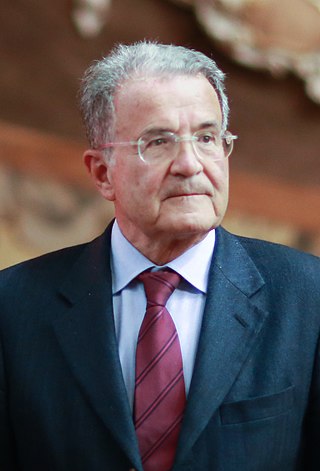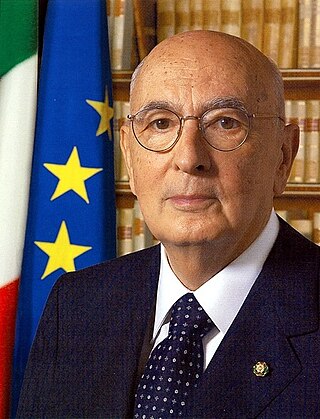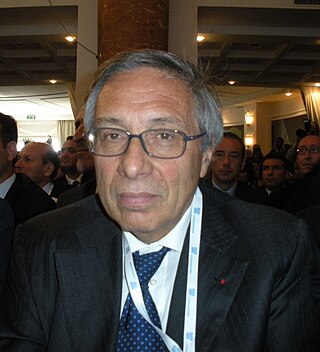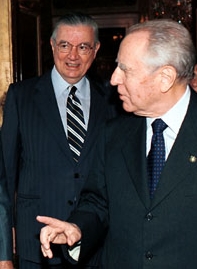
Romano Prodi is an Italian politician who served as President of the European Commission from 1999 to 2004 and twice as Prime Minister of Italy,from 1996 to 1998,and again 2006 to 2008. Prodi is considered the founder of the Italian centre-left and one of the most prominent and iconic figures of the Second Republic. He is often nicknamed Il Professore due to his academic career.

Franco Frattini was an Italian politician and magistrate. From January to December 2022,Frattini served as president of the Council of State.

Giorgio Napolitano was an Italian politician who served as the president of Italy from 2006 to 2015,the first to be re-elected to the office. In office for 8 years and 244 days,he was the longest-serving president,until the record was surpassed by Sergio Mattarella in 2023. He also was the longest-lived president in the history of the Italian Republic,which has been in existence since 1946. Although he was a prominent figure of the First Italian Republic,he did not take part in the Constituent Assembly of Italy that drafted the Italian constitution;he is considered one of the symbols of the Second Italian Republic,which came about after the Tangentopoli scandal of the 1990s. Due to his dominant position in Italian politics,some critics have sometimes referred to him as Re Giorgio.

Prokopios Pavlopoulos,commonly shortened to Prokopis (Προκόπης),is a Greek retired politician,who served as the president of Greece from 2015 to 2020. A member of New Democracy,he previously was Minister of the Interior from 2004 to 2009. He was succeeded by Katerina Sakellaropoulou on 13 March 2020,who became the first woman to serve as President of Greece.

The Ministry of Defence is the government body of the Italian Republic responsible for military and civil defence matters and managing the Italian Armed Forces. It is led by the Italian Minister of Defence,a position occupied by Guido Crosetto since October 2022.

Staffan de Mistura is an Italian-Swedish diplomat,United Nations official and former member of the Italian government.

Franco Bassanini is an Italian lawyer,politician,minister and undersecretary of state.

Carlo De Benedetti is an Italian industrialist,engineer,and publisher. He is both an Italian and naturalized Swiss citizen. He was awarded the Order of Merit for Labour by the Italian state in 1983,the Medaglia d'oro ai benemeriti della cultura e dell'arte and the Legion d'Honneur in 1987.

Edgars Rinkēvičs is a Latvian public official and politician serving as the 11th and current president of Latvia since July 2023. He previously served as the minister of foreign affairs of Latvia from 2011 to 2023,and head of the Chancery of the President of Latvia as state secretary of the Ministry of Defence,as well as a deputy of the Saeima.

The Italian honours system is a means to reward achievements or service to the Italian Republic,formerly the Kingdom of Italy,including the Italian Social Republic.

Giorgio Starace is an Italian diplomat,the current Ambassador to Russian Federation. In his earlier career,he used to be an Ambassador to Japan and to the United Arab Emirates.

Augusto Antonio Barbera is an Italian judge and former constitutional law professor at the University of Bologna. In his political career he was member of the Chamber of Deputies between 1976 and 1994 for the Italian Communist Party and later the Democratic Party of the Left. In 1993 he served shortly as Minister without portfolio for relations with Parliament in the government of Prime Minister Carlo Azeglio Ciampi. Barbera has been Judge of the Constitutional Court of Italy since 21 December 2015 and its President since 12 December 2023.
The awards for Civil Valor are the honors the Italian Republic grants in order to "reward acts of exceptional courage that clearly manifest civic virtue and to recognize the recipients as worthy of public honor". Individual citizens can receive the award,and it can also be bestowed collectively on all members of a military department or all residents of a municipality,city,or province when they have knowingly exposed their life to manifest danger.

Gaetano Gifuni was an Italian civil servant and politician who served as Secretary General of the President from 1992 to 2006 and as Minister for Relations with the Parliament in 1987.

A Ministry of the Republic of Italy is an administrative organ of the Republic of Italy,placed at the top of Italian public administration and is characterised by one or more specific competencies,with an organised structure,often varying over time.

Enrico Ferri was an Italian politician and magistrate.
Umberto Vattani is an Italian diplomat. The only official in the history of Italy to have twice held the position of Secretary General of the Ministry of Foreign Affairs. He was also the last president of the National Institute for Foreign Trade until his suppression in 2011.

Gianfranco Ciaurro was an Italian politician.

Gaetano Azzariti was an Italian jurist and politician,who headed the Commission on Race under the Fascist regime,and served as Minister of Justice of the Badoglio I Cabinet after the fall of the regime. After the war,from 1957 to 1961,he was president of the Constitutional Court of Italy.

In the Italian government,ministers without portfolio are nominated by the President of the Council of Ministers and formally appointed by the President of the Republic to lead particular departments directly under the Presidency of the Council of Ministers. Unlike the office of State Undersecretary to the Presidency,who fulfils duties in the Prime Minister's remit,ministers without portfolio enjoy the full status of ministers but do not lead an independent ministry. Departments on equalities,European affairs,and relations with regions,for example,are usually led by ministers without portfolio.

















